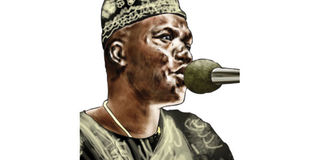Benga music at a crossroads, but the beat goes on

Okatch Biggy gave benga music a whole new taste and feel when he formed the Heka Heka band in 1991. ILLUSTRATION | JOHN NYAGAH
What you need to know:
To many music fans, the benga beat, which has its origins on the shores of Lake Victoria, seems to be slowly declining.
- In the recent past when benga music rode the wave of national popularity, it appears to receive lukewarm reception from music enthusiasts.
- Surviving bands have restricted themselves to small pubs in downtown Nairobi.
When Joseph Kamaru died, about five months ago, another crucial link to a waning benga beat was cut.
Although, Mr Kamaru had quit as a recording artiste for close to two decades, his death — and that of many artistes who popularised the benga beat — pushed the sounds deeper into the abyss.
While benga is Kenya’s biggest contribution to the development of African music, with a diverse roster of artists and labels, it has been going through serious challenges.
FEWER BANDS
Nairobi-based benga music producer and distributor Paul Okoth says the decline of the genre started from the 1990s, particularly, following the death of most of the legendary proponents of the style.
“It has been a sad scenario as most of the big names like George Ramogi, George Ojijo, Dr Collela Mazee, Ochieng Nelly and DO Misiani appear not to have groomed artistes to fit in their shoes, hence that gap,” Okoth says.
To many music fans, the benga beat, which has its origins on the shores of Lake Victoria, seems to be slowly declining, judging from the fewer bands specialising in this distinctive style, characterised by bewitching guitar lines, drums and vocals. But there are still some groups performing in the beat that has its roots in the Luo community.
Benga emerged in the early 1960s, and spread to Congo and Cameroon, speeding up the Cubano-style influenced slow dance music that was loved in the Congolese capitals of Kinshasa, Brazzaville and Douala.
Locally, benga spread to central and eastern Kenya, mainly through the export of guitarists from the region. The result was the emergence of several top benga musicians led by Daniel Kamau (DK), Kakai Kilonzo, and several others who for decades excelled in Nairobi and in those two regions.
In the recent past, unlike in the 1970s and into the 1980s when benga music rode the wave of national popularity, it appears to receive lukewarm reception from music enthusiasts — thanks to the generational change.
SMALL BARS
The decline in the popularity of benga music has partly been attributed to the advent of Ohangla, an equally vibrant beat produced by the one-stringed instrument (ohangla) and drums. This new genre has taken the music scene by storm, dominating the dance floor as well as happy and sad occasions such as weddings and funerals.
Incidentally, Misiani, considered one of the proponents of benga, was born in Shirati in northeastern Tanzania, grew up and performed in Kenya until his death in a road accident in Kisumu in May, 2006.
It was no wonder that even top Congolese Soukous stars lifted lines from one of DO Misiani’s “Kiseru” to spice up their “Nairobi Nights” track. Other popular songs by Misiani include “Harusi ya MK”, “Lala Salama” and “Isabella”.
As George Ouma (Jojo Records), another benga music producer noted, the somewhat declining Benga music can be sustained through support from producers.
“The limited number of Benga musicians need plenty of moral and technical support from well-wishers to sustain themselves in the now competitive market,” George said.
However, all isn’t lost as there are a few Benga groups such as the Super Victoria Band, an offshoot of mercurial star Dr Collela Mazee’s Victoria ‘B’ Kings Band, which is soldiering on. Super Victoria is scheduled to launch an audio album on Saturday in Mombasa.
However, most of these groups have been restricted to small bars in Nairobi shying away from the upmarket clientele and big shows.
For instance, Victoria “B” Kings led by Papa Odhiambo is today based at the Duet Club on Mfangano Street in downtown Nairobi and is the only live band that plays benga within Nairobi’s CBD.





